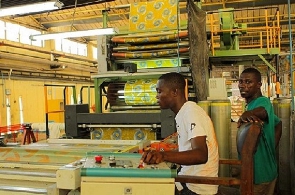The Chief Executive Officer (CEO) of Javon Effects Limited, Godson Sena Adjavor, has called for more investment in the country's textile industry.
Speaking on Friday, March 10, 2023, on the Class Morning Show with Korku Lumor, he called on the country to move into total textile manufacturing, by investing in raw materials at the sector, through to its finishing.
According to him, Ghana's textile companies cannot compete with their Chinese counterparts because the latter produces all of the raw materials required by the industry for production, whereas the former imports everything, making their cost of production extremely high.
“You cannot be in production in the textile industry without raw materials,” Mr Adjavor asserted. “Today, the textile industry lacks raw materials produced in Ghana.
“The chunk of materials used for the textile industry are all imported, it's only 10% that are made in Ghana.”
“Everything about the textile industry in Ghana is basically foreign. Even the basic school uniforms being used by our children and the security agencies are all produced outside. How do you expect to compete with China when they are producing their own raw materials?” he quizzed.
“The cost of production of textiles is so expensive that it ends up increasing the price of textiles in Ghana,” he bemoaned.
Another guest on the Class 91.3 FM programme who is also the Creative Head of Abrantie The Gentleman Clothing, Oheneba Yaw Boamah, indicated that the influx of textile products from foreign markets is not only collapsing the local textile industry, but also changing the taste of Ghanaians.
“The textile industries were doing well before the liberalisation of the sector in the late 1980s,” Mr Boamah posited.
“Our textile companies are collapsing due to a myriad of challenges facing them i.e. high cost of operations, poor policy framework, and Ghanaians' preference for foreign prints mainly as a result of the high cost of the local products,” he went on.
He, therefore, called for a revamp of the local textile industry as well as proper policy frameworks to ban the importation of textile materials into the country.
“We must try as a matter of urgency to revamp local textile factories, use policy to ban the importation of textile materials, as well as put in place mechanisms to increase consumption of made-in-Ghana prints,” he said.
On his part, Mr Adjavor underscored the effects of imported textile materials on the health of consumers.
“Majority of Ghanaian companies are not able to get access to AGOA markets due to their inability to meet standards on the American market.
“This is because, majority of the chemical composition of textile materials on the market cannot be determined and this poses great health risks to all of us,” he noted.
He advocated for more investors to venture into the sector, since it holds great potential, both for their investments and for the fortunes of the country.
“It will take about $20 to 35 million to procure the grey baft technology and put together a textile infrastructure which will largely improve textile production in Ghana. These technologies are essential in increasing the capacity of the local textile industry.
“The textiles industry remains a cash cow; it's the best place to make money in Ghana. Billions of dollars are lost [by] the State due to a neglect of the industry,” he stressed.
“Ghanaian investors must venture into the textile manufacturing industry. It will do a lot of good to us. Our collection of rich designs [is] in high demand globally. Let's build Ghana together through the textile sector,” he rallied.
General News of Saturday, 11 March 2023
Source: classfmonline.com

















